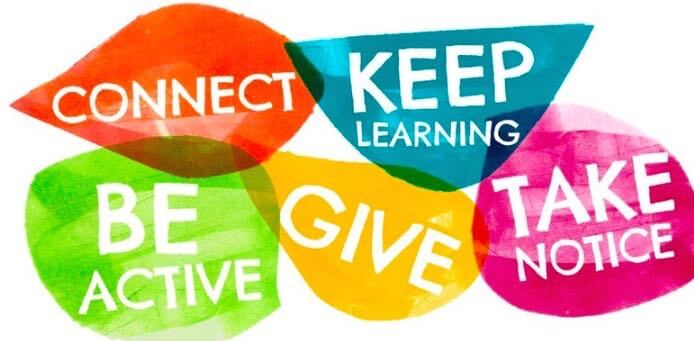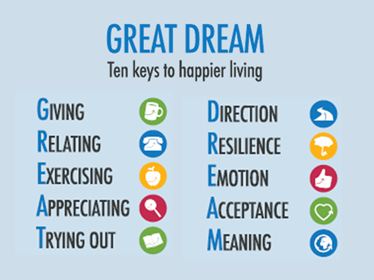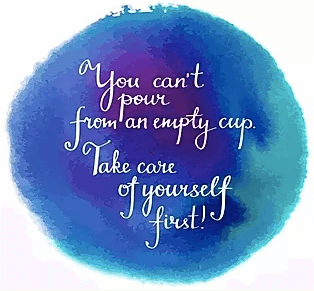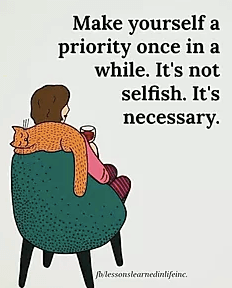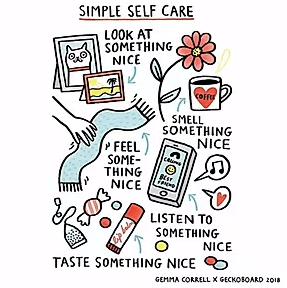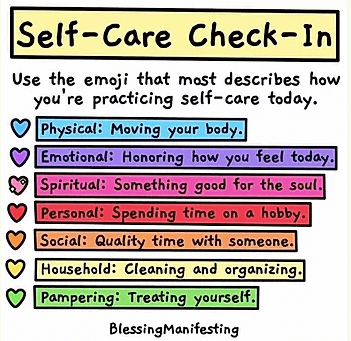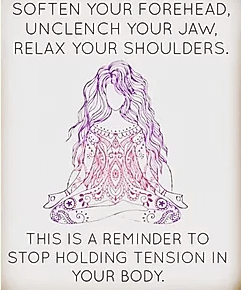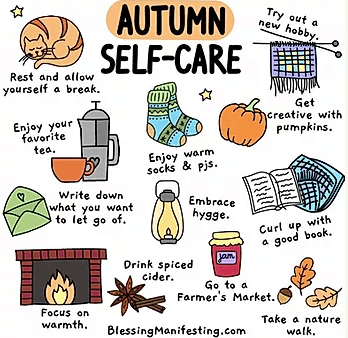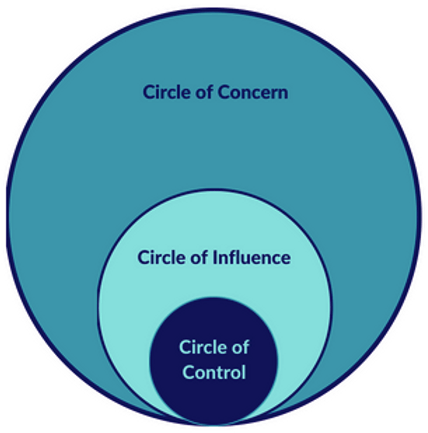Keeping Mentally Well
5 Ways to Wellbeing
- Connect – connect with the people around you: your family, friends, colleagues and neighbours. At home, work, school or your community. Spend time developing these relationships and building these connections to enrich you every day.
- Be active – you don't have to go to the gym. Take a walk, do some gardening or dance around your kitchen. Find an activity that you enjoy and make it a part of your life. Exercising makes you feel good.
- Keep learning – try something new or rediscover an old skill or interest. You'll find fun and a new sense of confidence. So why not sign up for that cooking course, start learning to play a musical instrument, learning a new language, or figure out how to fix your bike?
- Give to others – even the smallest act can count, whether it's a smile, a thank you or a kind word. Larger acts, such as volunteering at your local community centre, can improve your mental wellbeing and help you build new social networks.
- Take notice – be curious. Catch sight of the beautiful. Notice the changing seasons. Notice the architecture. Be aware of the world around you and your feelings. Reflecting on experiences will help you appreciate what matters to you.
Inside: Our attitude to life
- Direction – Feeling good about the future is important for our happiness. We all need goals to motivate us and these need to be challenging enough to excite us, but also achievable. Choosing ambitious but realistic goals gives our lives direction and brings a sense of accomplishment and satisfaction when we achieve them.
- Resilience – All of us have times of stress, loss, failure or trauma in our lives. But how we respond to these has a big impact on our well-being. We often cannot choose what happens to us, but we can choose our own attitude to what happens. In practice it's not always easy, but one of the most exciting findings from recent research is that resilience, like many other life skills, can be learned.
- Emotions – Positive emotions - like joy, gratitude, contentment, inspiration, and pride - are not just great at the time. Recent research shows that regularly experiencing them creates an 'upward spiral', helping to build our resources. So although we need to be realistic about life's ups and downs, it helps to focus on the good aspects of any situation - the glass half full rather than the glass half empty.
- Acceptance – No-one's perfect. But so often we compare our insides to other people's outsides. Dwelling on our flaws - what we're not rather than what we've got - makes it much harder to be happy. Learning to accept ourselves, warts and all, and being kinder to ourselves when things go wrong, increases our enjoyment of life, our resilience and our well-being. It also helps us accept others as they are.
- Meaning – People who have meaning and purpose in their lives are happier, feel more in control and get more out of what they do. They also experience less stress, anxiety and depression. But where do we find 'meaning and purpose'? It might be our religious faith, being a parent or doing a job that makes a difference. The answers vary for each of us but they all involve being connected to something bigger than ourselves.New Paragraph
10 Keys to Happier Living (actionforhappiness.org)
Outside: Our daily activities
- Giving – caring about others is fundamental to our happiness. Helping others is not only good for them and a great thing to do, it makes us happier and healthier too. We can create stronger connections with others. We don't have to give money, we can give our time, ideas and energy.
- Relating – relationships are the most important overall contributor to happiness. People with strong and broad social relationships are happier, healthier and live longer. Close relationships with family and friends provide love, meaning, support and increase our feelings of self worth. Broader networks bring a sense of belonging.
- Exercising – our body and our mind are connected. Being active makes us happier as well as being good for our physical health. It instantly improves our mood and can even lift us out of a depression.
- Awareness – We can stop and take notice. Learning to be more mindful and aware can do wonders for our well-being in all areas of life - like our walk to work, the way we eat or our relationships. It helps us get in tune with our feelings and stops us dwelling on the past or worrying about the future - so we get more out of the day-to-day
- Trying out – Learning affects our well-being in lots of positive ways. It exposes us to new ideas and helps us stay curious and engaged. It also gives us a sense of accomplishment and helps boost our self-confidence and resilience.
Self-care
Self-care is a deliberate activity we do to take care of our physical, mental and emotional health. It's something that is quite often overlooked. We are so busy with our every day lives, we don't stop to think about ourselves. Self-care or 'me time' can be built in and is key to improving mood and reducing anxiety.
Self-care can look different to different people, depending on lifestyle. Here are a few ideas:
- Nutrition
- The food we eat has the potential to create a body and mind that is healthy and alert or contribute to weight gain and sluggishness. Not only this but we can also think about how we eat. Do you mindlessly wolf down your dinner while watching television, or do you eat with no distractions around you so that you can be more mindful at meal times, enabling you to take longer digesting your food and increasing enjoyment?
Do you cook meals from scratch so you know what ingredients are going in? Do you have balance in your diet?
- Sleep
- Sleep is very important as it can have an instrumental effect on both our physical and emotional health. Lack of sleep can cause an array of health issues. Adults should try to get an average of 8 hours of sleep per night. How many of us can say that happens? Do you have a bed-time routine? When did you last have a caffiene drink? (It's recommended the last caffeine drink of the day should be at 12pm to avoid sleep disturbance). Head to the NHS Sleep Guide for more tips.
- Exercise
- Fantastic for our physical and mental health. Boosts mood and reduces feelings of stress and anxiety. You don't have to join a gym - take the stairs instead of the lift, go for a walk at lunch time, or my favourite - have a dance in the kitchen.
Other ideas - read a book, do some drawing or colouring, go to bed an hour earlier than usual, have a bubble bath with candles, watch an old movie with a glass of wine, yoga, meditation, take 5 minutes to reflect on the good things that have happened in the last week or on something that has made you smile or laugh... whatever you need to give yourself a bit of time to make you feel a bit more balanced and happier.
As I always say... Self-care is not selfish, it's necessary. If we want to be able to look after others, we need to look after ourselves first.
Sleep
Sleep is such an important factor for keeping our mental health in a positive space and reducing stress.
Keeping well during a pandemic
Keep a routine
Keeping a routine is really positive for our mental health. It helps to provide structure and focus, self-discipline, reduces distractions and can help us better manage our time. It also provides us with certainty. We know in life there is uncertainty but having a routine gives us certainty around what time we get up and go to bed, when we eat, when we rest and so on.
It doesn't have to be complicated! Simple things like:
- Getting up at the same time everyday
- Ensure we get dressed from PJ's into day wear
- Start the day with exercise to get moving, get our energy up and wake our body and minds up
- Eating meals at regular times each day, including blocking out time to cook - we are more likely to eat healthily
- To do list of what you want to achieve each day. This can be prepared the evening before.
- Build time in for self-care and rest breaks. That way we will achieve more of a balance, particularly if we are working remotely.
- Going to bed at the same time every evening and building good sleep hygiene. If we get into healthy habits around our sleep, for example by not looking at screens for an hour before bed, having a warm bath, reading, dimming lights, meditation and we do it at a regular time every night, the body starts to get ready for rest naturally.
Keep connected, stay social
Even though we can't physically be around people, we can still remain connected with one another. There is a lot said about social media and technology having a lot to answer for, but in these times I think we can be truly grateful for all the ways we can connect with each other...
Phone, Facebook, Instagram, Twitter, FaceTime, WhatsApp, Messenger, Snapchat, Zoom...the list is not exhaustive.
Nothing beats having a conversation so rather than firing off an email, why not pick up the phone instead or use some kind of Video Conference technology to get that social interaction?
Rather than WhatsApping a friend like you would usually, why not FaceTime or have a call instead? Make a list of your friendship / social / community groups and arrange a time to speak with them on a regular basis?
How about posting supportive comments / pictures / funny quotes to encourage interaction?
Join online forums / groups and encourage others to do the same and continue to be supportive of others who may need social connection.
Remember that there is a difference between staying connected and mindlessly scrolling through social media. The latter can be tiring in itself so pay attention to the time that you're spending on it, to be mindful of your mental health.
Laugh / be silly
Laughter and silliness is fantastic for keeping both positive mental health and physical health. We can try to seek out opportunities for laughter and silliness. Laughing is fun and it's great to share it with others.
We feel good when we laugh and immediately after. Some research says that we can feel good for up to 45 minutes after having laughed. It releases endorphins that makes us feel good, relaxes our body, burns calories, lightens anger, reduces stress and anxiety, strengthens resilience, boosts our mood, increases our immunity and protects the heart. Joy is good for us.
Children laugh up to 300 times per day, adults laugh up to 95% less than children. The saying goes 'laughter is the best medicine'.
So what can you do? Maybe you can watch a funny video? Get in touch with a funny friend? Reminisce about a story? Watch a comedian? Play with your pet? Or your kids?
If we have a routine, we can build 10-15 mins each day to seek out laughter and joy. It's all we need.
Choose optimism
Being optimistic is great for both mental and physical health. It reduces stress, anxiety and depression and as such heart disease and risk of stroke.
In life we have choice...orange or blackcurrant squash, avocado or beans on toast, read a book or watch a movie...We can choose optimism and be aware of our thoughts. It may not be natural to us and take time and practise but we can get better. So have a think about the last week - what has been positive? What has been good? What can you be optimistic about?
What have you noticed? Nature? Butterflies? Flowers? Architecture? Clouds? Fewer cars on the road? Fewer planes in the sky? With fewer cars and planes the knock on is less pollution, both chemical and noise which is better for our health and the planet. If you've built exercise into your routine, have you been getting that vitamin D from being outside? Has it made a change to your mood?
Have you noticed you're spending less money? Does your bank balance look better than you'd expect?
Are you connecting with new people and having better quality conversations?
We can be optimistic about the present but also about the future. A pandemic is temporary. Can you think about getting dates in diaries for the future - getting together with friends, booking in a game of tennis, being back in the office with your team?
Circle of concern, influence, control - practical exercise
Sometimes we feel overwhelmed with our concerns and worries. In times like these it's completely normal. You aren't alone. There are some helpful tools that can help us to manage our feelings.
Stephen Covey's Circle of Concern, Influence and Control is a great way to identify thoughts and concerns and become more self-aware.
1) Get a piece of paper and draw 3 circles, similar to the diagram opposite
2) Get another piece of paper and write on it all your concerns. This could be anything from
getting loo roll, to a toxic work relationship, to finances. Get everything down.
3) Cut your concerns out and place them in the outer circle - this is your circle of concern
4) Now look at all your concerns and identify which ones are in your control. Move these
to the most inner circle, your circle of control. It's common to find that a lot of our concerns
aren't in our control and that we have a lot of stress and anxiety about the things we've
written down and have no control over.
5) This is where the in between circle comes in, our circle of influence. We might not be able
to control things but we may be able to influence them. For example, a toxic relationship at
work - work with the individual to foster a better working relationship. No loo roll on the
shelves - we can't control or influence stocks and what other people do. Some things we
have to acknowledge, accept and let go.
6) The things you can influence - move them into your circle of influence. You can make an
action plan of changes you can make to influence that concern and to manage your feelings
about that.
7) The things that you can't control and can't influence, acknowledge, accept and let go. If
you can't control or influence some concerns is it helpful to stress about them? Or are you better off accepting and letting go?

